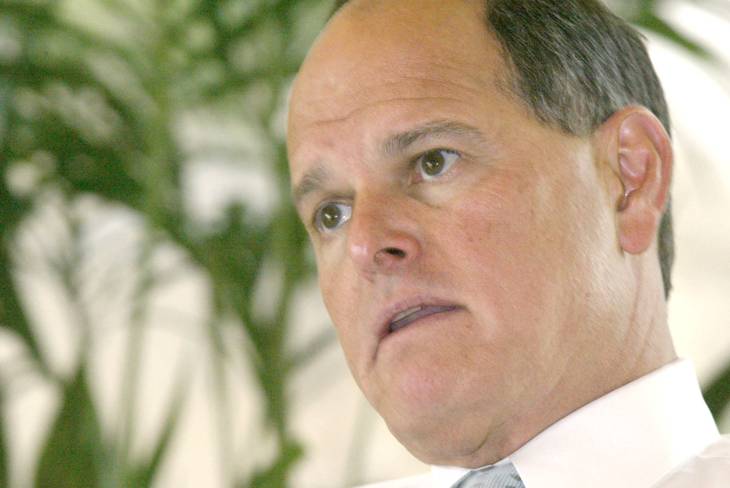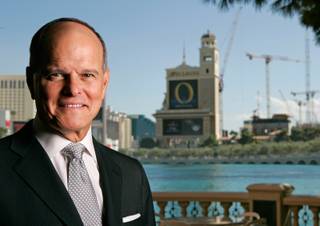Memorial
- A memorial mass will be held at 11 a.m. July 22 at Holy Family Catholic Church, 1527 Fremont Ave., South Pasadena, Calif. The family has requested that in lieu of flowers contributions be made to the Lanni Family Cancer Research Fund under the direction of Dr. Heinz-Josef Lenz of USC Norris Comprehensive Cancer Center.
Archives
- Former MGM CEO Terry Lanni dies at 68(07-15-2011)
- Former MGM Mirage CEO Lanni diagnosed with cancer (10-13-2009)
- Lanni exits at perilous time as industry faces hardship (11-16-2008)
- MGM Mirage exec to retire in Nov. 30 (11-13-2008)
- Lanni’s message to employees on his retirement (11-13-2008)
In an industry once known for crooks, toughs and juice, Terry Lanni — an unknown from a wealthy family in California — was recruited to bring legitimacy and professionalism to the casino business.
Lanni, who died Thursday at 68 from cancer, served as a public face not just of MGM Mirage, the company he steered through various incarnations for 13 years, but for a new generation of corporate casino executives.
Known for his gracious manners and deft management skills, Lanni was one of the industry’s longest-serving executives. His casino career began suddenly and auspiciously in 1977, when Caesars World Chairman Clifford Perlman hired him — then treasurer for a nondescript California conglomerate — through an executive search firm. Within a few years of being hired as chief financial officer, he was running Caesars World, a predecessor of Caesars Entertainment.
“He was the only one who came out of the (corporate world) who had a feeling for this business,” Perlman said. “He was probably innately suited for it.”
By the time he was running Caesars World and later, MGM Mirage, a forerunner to MGM Resorts International, many industry experts considered Lanni to be their most valued representative.
“There have been a small number of people who have made meaningful contributions to the overall advancement of the gaming industry and Nevada in particular,” state Gaming Control Board Chairman Mark Lipparelli said. “Terry Lanni was one of them. He set the bar higher.”
He was a polished speaker who wore expensive business suits, even on casual Fridays, and owned champion racehorses. He was impeccably neat, with an office that was as spotless when he left at the end of the day as it was when he arrived in the morning.
He was a hands-off manager who kept up with management decisions but entrusted subordinates to make key decisions. His cordiality with peers and underlings alike helped steer Nevada’s largest private employer through tough times.
Lanni urged everyone to call him by his first name and “treated everyone the same, no matter if they were a housekeeper or a CEO, a $2 blackjack player or high roller,” said Rich Rose, who worked for Lanni as head of sports marketing at Caesars Palace in the 1980s. “He was genuinely interested in people’s well-being.”
In December 2007, when industry pundits anticipated continued growth in gaming, Lanni was the first major casino executive to step forward with an assessment of rough waters ahead that few others were voicing:
“I think we’re going to have a very difficult ’08 in our business,” Lanni told the Sun. His gloomy forecast was not shared locally although many experts outside Las Vegas were sounding alarms about the housing slump, rising interest rates and a poor consumer spending outlook.
Still, neither Lanni nor any other casino executive publicly predicted the extent of the crippling, long-term business slump that caught Las Vegas — amid its most ambitious growth spurt in history — off-guard.
“This business sometimes has a way of making the smartest people in it look like they don’t know what they are doing,” Lanni acknowledged years ago.
As the state’s budget deficit loomed in 2008, Lanni hammered the business community for lobbying against a broad-based tax system that would have increased taxes on nongambling businesses.
That year, Lanni resigned from the American Gaming Association board, citing frustration with Nevada’s tax problems and a desire to focus more energy on helping to fix it. At the time, he supported an increase in the state’s businesswide payroll tax over the more palatable suggestion that the Legislature passed. The resulting tax increase on hotel rooms was borne by tourists.
“Why education should only be paid for by visitors I’ve never quite understood. Businesses that operate here should be willing to fund education,” Lanni told the Sun. Lanni was a lead partner in the Clark County School District’s Empowerment School Program and spearheaded MGM’s Academic Excellence Scholarship Endowment at UNLV. He also led the founding of the MGM Resorts Foundation, an employee giving arm of the company.
In 2003, MGM Mirage gave up its membership in the Las Vegas Chamber of Commerce after a gross receipts tax plan failed to win legislative support. The chamber had opposed the plan.
That kind of outspokenness was characteristic of Lanni, friends and associates say.
“He was absolutely frank about what was on his mind,” Perlman said. “He was completely honest.”
Under Lanni’s direction, MGM became the first casino giant to pursue a Web-based casino at a time when competitors, worried about potential competition from Internet casinos and poker rooms, hung back.
Outlawing Internet gambling in the United States wasn’t stopping people from risking their money playing on unregulated sites, while regulations could offer some consumer protection, Lanni said at the time.
MGM Mirage opened a virtual casino for British customers in 2001 but scrapped the effort two years later at a cost of millions of dollars because the company couldn’t compete against bigger, black market operators based offshore.
By showing how Internet gambling could be regulated in a manner similar to brick-and-mortar casinos, MGM helped pave the way for Nevada regulators to consider allowing Internet gambling for the state’s residents.
Lanni also launched the casino industry’s largest corporate diversity campaign at a time when Las Vegas casinos were criticized for being too white and too male — a program that earned national honors from minority groups and gay-rights organizations.
Some MGM employees recall an annual employee meeting a few years ago when Lanni, unannounced, introduced an unknown woman standing in the audience as a friend he had known since the 1950s when they attended elementary school together. Some parents didn’t want her to attend the school, located in a wealthy, white neighborhood, because she was black, Lanni told employees.
“It was a breathtaking moment (about) how racism had come into his view at early life and how wrong it was,” MGM spokesman Alan Feldman said. “He didn’t need to tell that story. But he knew it was important.”
In an industry populated with brash, unapologetic personalities, Lanni was also a consensus-builder, respected by friends and foes alike.
He represented the industry’s interests as the only casino executive member of the National Gambling Impact Study Commission, a nine-member group charged by Congress to conduct the first major study of casino gambling’s effect on the country. The commission’s final report in 1999 recommended that casinos provide help for compulsive gamblers and that the federal government continue to crack down on Internet gambling. The report also recommended that local governments considering casino legalization recognize that Las Vegas-style resorts for tourists are better for the economy than casinos for local residents.
“Terry genuinely cared about bringing the industry together to tackle its challenges,” said Frank Fahrenkopf, president and CEO of the American Gaming Association. “He was a collaborator and innovator, and his savvy business sense helped guide MGM and, through the AGA, the broader gaming industry to unprecedented levels of success.”
With another member of the Gambling Impact Study Commission, UniteHere President John Wilhelm, Lanni would negotiate many years of labor peace on the Strip.
“With Terry … we had some of our least contentious bargaining with the union,” said Las Vegas attorney Mike Sloan, a longtime friend and neighbor who did legal work for Lanni’s companies.
Lanni announced his retirement — saying it was planned in advance — the same day The Wall Street Journal reported that he had not received a Masters of Business Administration from the University of Southern California as his resume had indicated. Lanni, who had donated money to USC as well as other institutions and charities over the years and who had been named Alumnus of the Year by the business school in 1992, never addressed the issue.
The news upset friends and associates who believed that the flap had overshadowed his accomplishments and implied that he would not have succeeded in the industry had his resume not been embellished.
Lanni had succeeded regardless of any graduate degree, they said.
“I never heard anybody in gaming say a bad word about Terry,” Sloan said. “Like many businesses, there are petty jealousies. And the higher you go in the food chain, the bigger the ego. Not Terry.”
He is survived by his wife, Debbie, and sons Sean and Patrick. Funeral services are pending.

